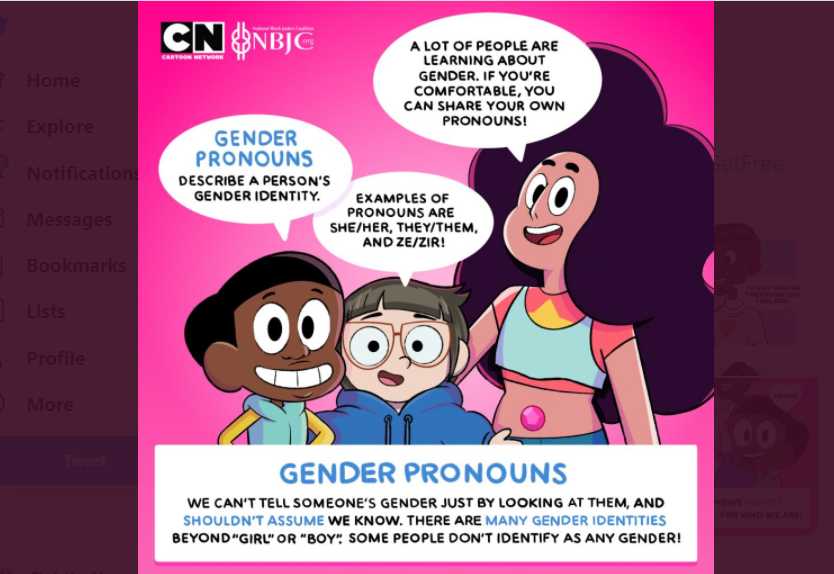 The Cartoon Network, in conjunction with the National Black Justice Coalition (NBJC), recently released a comic strip on social media to teach youth about obliging the use of others’ preferred pronouns, stating that “there are many gender identities beyond girl or boy.” The post has received pushback from parents who do not believe children should be indoctrinated with such ideas.
The Cartoon Network, in conjunction with the National Black Justice Coalition (NBJC), recently released a comic strip on social media to teach youth about obliging the use of others’ preferred pronouns, stating that “there are many gender identities beyond girl or boy.” The post has received pushback from parents who do not believe children should be indoctrinated with such ideas.
“We can’t tell someone’s gender just by looking at them and shouldn’t assume we know,” one graphic reads. “There are many gender identities beyond girl or boy. Some people don’t identify as any gender!”
The comic strip features Stevonnie from “Steven Universe” and Craig from “Craig of the Creek” who meet other children and learn what their preferred pronouns are, including “they/them.” Stevonnie says that she herself identifies as “they/them.”
“Wow! I thought there was only she/her and he/him,” a new friend named Chloe states. “I’ve learned something new today!”
The strip ends with the assertion, “Using someone’s pronouns shows respect. We all need to be seen and loved for who we are!”
According to reports, the graphic was created by members of the Coalition’s Youth and Young Adult Action Council (YYAAC), along with artist Steven Lowe (@steeeeevn) and creators from Cartoon Network Studios, among others.
“This comic was created to embrace and acknowledge the role of selfhood and inclusion,” YYAAC member Justin Calhoun remarked in a statement. “This partnership between NBJC and Cartoon Network is an act of visibility that centers the needs of queer youth to ensure that they are not only accepted, but also thriving!”
“Part of the excitement of this project is that we are engaging a topic that young people almost always have experience with, but don’t often have the space to discuss,” YYAAC member Tyler Miles also remarked, according to Comic Book Resources.
“Whether these youth identify as transgender, gender nonconforming, cis, or the multitude of identities therein, this comic is a radical act of trust and care to reach all youth who are beginning to, or have already, thought critically about gender.”
However, while some liked the comic strip and called opponents “transphobes” or contended that “language is always evolving,” a number of commenters stated that such material should not be taught to children.
“How on Earth is this for kids? They barely know their division!” one exclaimed.
“Why are we shoving this topic down kids’ throats? What kid is thinking about this at this age without it being heavily influenced in the household?” another asked. “The last generation was not pressured like they want to push and pressure this on our next generation.”
“Just because someone believes something, doesn’t mean that belief should be automatically respected,” a psychologist chimed in. “It’s a terrible lesson to teach kids that beliefs are immune to criticism simply by the nature of them being beliefs.”
“1) There are only two genders 2) The only pronouns you can use for humans is ‘he’ and ‘she’ 3) ‘They/them’ is used for multiple people,” another commenter noted succinctly.
As previously reported, the Cartoon Network also celebrated Pride Month in June, releasing videos with teens talking about homosexuality and transgenderism and finding the “courage” to be an activist for the cause. It additionally created a Pride Month playlist, featuring episodes from the cartoons “Steven Universe” and “Craig of the Creek.”
In 2018, “Steven Universe” featured episodes where the female characters Sapphire and Ruby became engaged and “married,” locking lips after being pronounced “Garnet.” The “Craig of the Creek” episode “The Haunted Dollhouse” depicted an occultic séance, during which witches Courtney and Tabitha were caught kissing in the dark.

As previously reported, while the Bible teaches kindness toward others, it also instructs that affirming sin is not loving, as sin separates men from God (Isaiah 59:2; 1 John 3:8; Romans 1:18).
Scripture states that the unregenerate man is naturally drawn to desire what is verboten as all are born with the Adamic sin nature (Romans 5:19), having various inherent feelings and inclinations that are contrary to the law of God and being utterly incapable of changing by themselves (Job 14:4).
James 1:13-14 outlines, “Let no man say when he is tempted, ‘I am tempted of God,’ for God cannot be tempted with evil, neither tempteth He any man. But every man is tempted when he is drawn away of his own lust and enticed.”
All men are therefore lawbreakers and guilty in the sight of God (Romans 3:19), evoking His wrath.
“[W]e all had our conversation in times past in the lusts of our flesh, fulfilling the desires of the flesh and of the mind, and were by nature the children of wrath, even as others,” Ephesians 2:3 teaches.
It is why Jesus came: to do what men could not do for themselves, to “save His people from their sins” (Matthew 1:21).
Scripture outlines that Jesus came to be the propitiation for men’s sins (1 John 2:2; 1 John 4:10), a doctrine in Christianity known as substitutionary atonement, and to save men from the wrath of God for their violations against His law (Romans 4:25, Romans 5:9, Romans 5:16), a doctrine known as justification.

In light of Christ laying down his life for His enemies (Romans 5:10), God calls all men to repent and believe the gospel (Mark 1:15).
Acts 2:38-40 exhorts, “Repent, and be baptized every one of you in the name of Jesus Christ for the remission of sins, and ye shall receive the gift of the Holy Ghost. For the promise is unto you and to your children, and to all that are afar off, even as many as the Lord our God shall call. … Save yourselves from this untoward generation.”
The Bible also teaches about regeneration, as in addition to sparing guilty men from eternal punishment, Christ sent his Holy Spirit to make those who would repent and believe new creatures in the here and now, with new desires and an ability to do what is pleasing in the sight of God by His indwelling and empowerment (Ezekiel 11:19, 2 Corinthians 5:17, Titus 3:5).
Jesus said that men must be born again — a work of the Spirit transforming their very nature from being in Adam to being in Christ, or they cannot see the Kingdom of God (John 3:3-8).
Romans 6:22-23 joys, “But now being made free from sin and become servants to God, ye have your fruit unto holiness and the end everlasting life. For the wages of sin is death, but the gift of God is eternal life through Jesus Christ our Lord.”
Become a Christian News Network Supporter...


